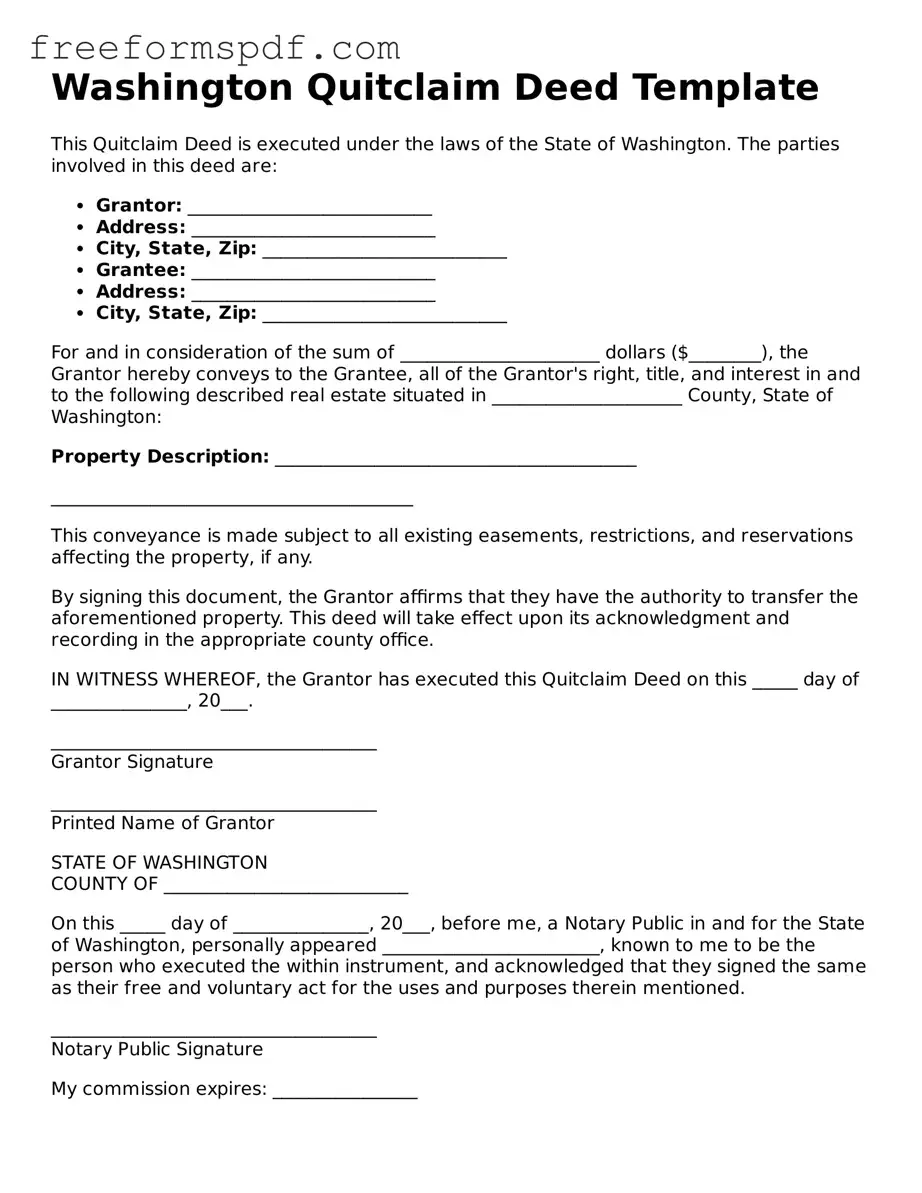Attorney-Verified Quitclaim Deed Document for Washington State
Common mistakes
-
Not Including All Necessary Information: One common mistake is failing to provide complete information about the property and the parties involved. Ensure that you include the full names of the grantor and grantee, as well as a clear description of the property being transferred.
-
Incorrectly Signing the Document: The signature of the grantor must be present. Sometimes, people forget to sign or have someone else sign on their behalf. This can lead to the deed being invalid. Make sure the grantor signs in front of a notary public.
-
Not Notarizing the Deed: A quitclaim deed must be notarized to be legally binding. Failing to have the document notarized can result in issues when trying to record the deed with the county. Always check that a notary has witnessed the signing.
-
Ignoring Local Recording Requirements: Each county may have specific requirements for recording a quitclaim deed. Some people neglect to check these requirements, which can lead to delays or rejection of the deed. Research your local rules before submitting the document.
Learn More on This Form
-
What is a Quitclaim Deed?
A quitclaim deed is a legal document used to transfer ownership of real estate from one person to another. Unlike other types of deeds, a quitclaim deed does not guarantee that the person transferring the property has clear title. Instead, it simply conveys whatever interest the grantor has in the property, if any.
-
When should I use a Quitclaim Deed?
Quitclaim deeds are commonly used in situations where the parties know each other, such as family transfers, divorce settlements, or when adding or removing a spouse from the title. They are also useful for clearing up title issues or transferring property between business partners.
-
How do I complete a Quitclaim Deed in Washington?
To complete a quitclaim deed in Washington, you need to fill out the form with the following information: the names of the grantor (the person transferring the property) and the grantee (the person receiving the property), a legal description of the property, and the date of the transfer. Ensure that the document is signed in front of a notary public.
-
Do I need to record the Quitclaim Deed?
Yes, it is advisable to record the quitclaim deed with the county auditor's office where the property is located. Recording the deed provides public notice of the ownership transfer and protects the grantee's rights to the property.
-
Are there any fees associated with a Quitclaim Deed?
There may be fees for recording the quitclaim deed, which vary by county. Additionally, if you are transferring property as part of a sale, you might encounter other costs, such as title insurance or transfer taxes. Always check with your local county office for specific fees.
-
Can a Quitclaim Deed be revoked?
Once a quitclaim deed is executed and recorded, it cannot be revoked unilaterally. The grantor cannot take back the property without the consent of the grantee. If you need to reverse a transfer, you may need to execute a new deed or pursue legal action, depending on the circumstances.
Misconceptions
Understanding the Washington Quitclaim Deed form is crucial for anyone involved in property transactions. However, several misconceptions can lead to confusion. Below are nine common misunderstandings regarding this form, along with clarifications.
- A quitclaim deed transfers ownership completely. This is misleading. A quitclaim deed transfers whatever interest the grantor has in the property, but it does not guarantee that the grantor holds any legal title.
- Quitclaim deeds are only for family transfers. While often used among family members, quitclaim deeds can be utilized in various situations, including sales, divorces, or settling disputes.
- Quitclaim deeds eliminate the need for title insurance. This is incorrect. Title insurance is still advisable, as it protects against potential claims or defects in the title that may not be disclosed.
- Using a quitclaim deed is a quick way to clear up title issues. This is not always true. While it can simplify transfers, it does not resolve existing title problems and may even complicate matters.
- Quitclaim deeds are only valid if notarized. Although notarization is essential for validity, it must also be recorded with the county to ensure enforceability against third parties.
- All quitclaim deeds are the same. This is a misconception. The language and terms can vary significantly based on the specific situation and the parties involved.
- Once a quitclaim deed is signed, it cannot be revoked. This is misleading. In some cases, a quitclaim deed can be revoked or contested, depending on the circumstances surrounding its execution.
- Quitclaim deeds are only for real estate. While primarily used for real estate, quitclaim deeds can also apply to other types of property, including personal property.
- Quitclaim deeds do not require legal assistance. Although individuals may use them without an attorney, seeking legal guidance is highly recommended to avoid potential pitfalls.
Being aware of these misconceptions can help individuals make informed decisions when dealing with quitclaim deeds in Washington. Always consider consulting with a legal professional for tailored advice and to ensure proper handling of property transactions.
Some Other Quitclaim Deed State Templates
How to File a Quitclaim Deed in Virginia - This deed type may be preferable for informal agreements where no money changes hands.
For those looking to navigate the essentials of a vehicle sale, understanding the nuances of the motor vehicle bill of sale form is vital. This document not only facilitates the transfer process but also safeguards both parties involved by clearly outlining the terms of the deal.
Quit Claim Deed Oregon - It is often used to clear up title issues when transferring property between relatives.
